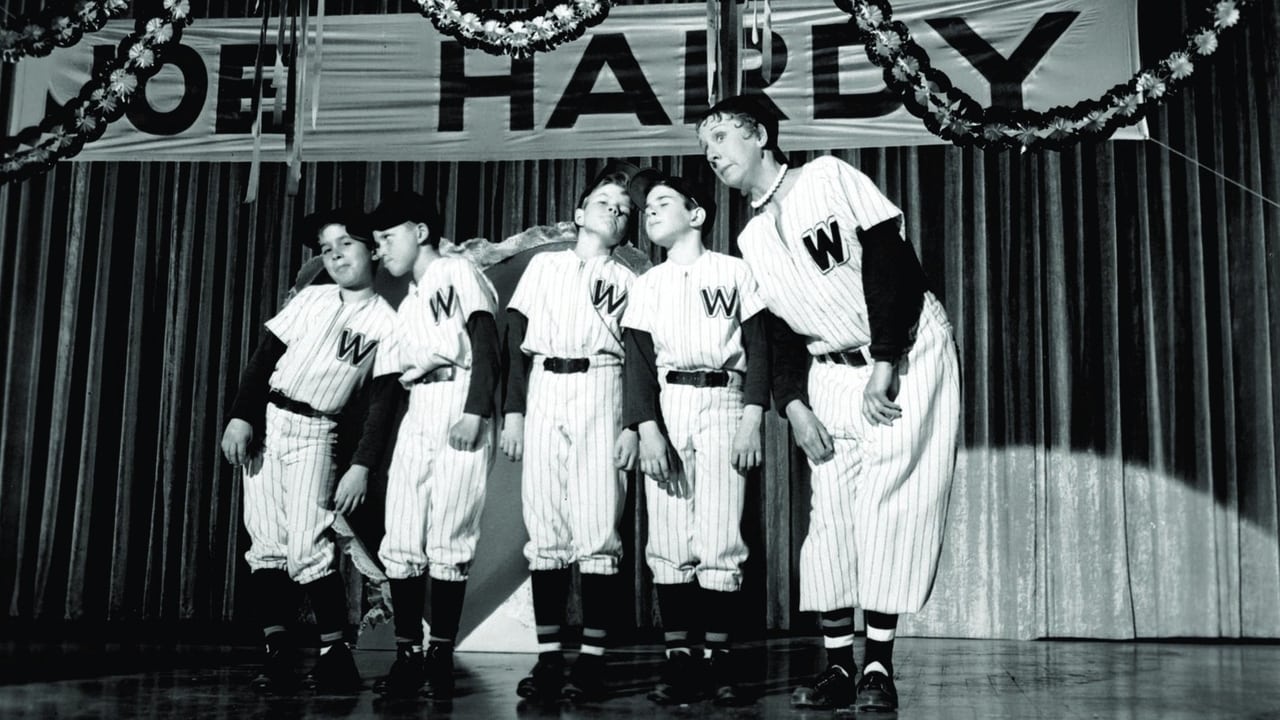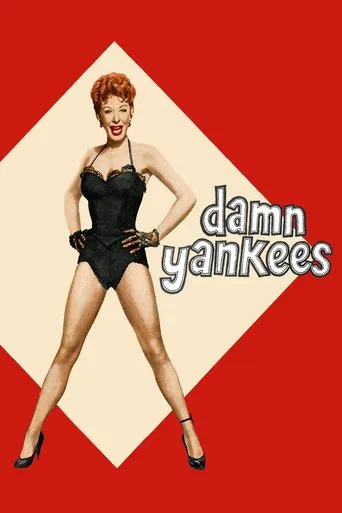

Most undeservingly overhyped movie of all time??
... View MoreIt's simply great fun, a winsome film and an occasionally over-the-top luxury fantasy that never flags.
... View MoreThere is, somehow, an interesting story here, as well as some good acting. There are also some good scenes
... View MoreThe thing I enjoyed most about the film is the fact that it doesn't shy away from being a super-sized-cliche;
... View MoreAn aging baseball fan sells his soul to the Devil for a career with his favorite team, the Washington Senators, currently languishing in seventh place. Ray Walston's Mr. Applegate--a chic, suave Beelzebub, who smiles like a Cheshire cat--is really the only lively aspect of this heavy-spirited Broadway musical adaptation, which in turn was taken from Douglass Wallop's book "The Year the Yankees Lost the Pennant". Co-directed by George Abbott and Stanley Donen, with choreography by Bob Fosse, the picture has a better plot (its roots in Faust) than this team's "The Pajama Game" from the year before, but still seems awfully stagy and stagnant, with the song numbers belted towards the rafters. As the protagonist's youthful incarnation, Tab Hunter tries hard but is still too colorless to make a strong impression. ** from ****
... View MoreI saw "Damn Yankees" shortly after seeing another George Abbott/Stanley Donen collaboration, "The Pajama Game," which set the bar so low that just about any musical would seem better."Damn Yankees" on its own terms is a little flat and never explodes into the energy it probably has on stage, but it comes close, and much closer than "The Pajama Game" ever does. Gwen Verdon is almost exclusively the film's appeal -- not especially pretty, there's nevertheless something about her (call it good old-fashioned show-biz chutzpah) that makes it impossible to take your eyes off of her when she's on the screen. And this film benefits from a slew of dance numbers choreographed by Bob Fosse, the most memorable being the "Who's Got the Pain?" number that Fosse himself dances with wife Verdon (though I'm not sure whether or not they were married when they made this movie). If for no other reason, see this film for that number, which captures two theatre legends at their best.Grade: B
... View MoreAs musicals go, DAMN YANKEES was a highly popular Broadway hit because it gave the audience GWEN VERDON's way with a song and dance and Bob Fosse's choreography. It may not have been as filled with hit tunes as some, but "You Gotta Have Heart", "Whatever Lola Wants," and "Two Lost Souls" were good enough to make theater patrons happy.When Verdon (and Ray Walston) won their Tony's, it was a good thing Warner Bros. decided to lure both of them to Hollywood for the screen version. For box-office insurance they had hunky TAB HUNTER to ensure that movie fans would show up--and, surprisingly, it all works very well. Hunter is no great shakes as a vocalist, but he's pleasantly unassuming and gets by on his duet with Verdon.GWEN VERDON lights up the screen whenever she goes into one of her routines, and her "Whatever Lola Wants" is worth the price of admission alone. RAY WALSTON has a devilish time in his rib-tickling role and it's all easy to take as a merry mixture of music and comedy.The only drawback is that its stage origins are immediately apparent and there's a certain static quality about some of the scenes. But overall, George Abbott and Stanley Donen keep it fresh and lively whenever the music takes center stage.
... View MoreThe superb Gwen Verdon sings and dances and mugs through this very good adaptation of the smash Broadway musical. Verdon is a cross between Shirley MacLaine and Carol Burnett with a dash of Carol Haney (another Bob Fosse protégé) tossed in. She's a total delight and one of the best dancers EVER! Here she plays Lola, the temptress used by the devil (Ray Walston) to lure Joe Hardy (Tab Hunter) from going back to his wife and breaking his satanic deal in which middle-aged Joe becomes a 22-year-old baseball star and catapults the Washington Senators to 1st place.Tab Hunter replaces Stephen Douglass from the Broadway show. The rest of the cast recreates their parts for the movie. Verdon, Walston, and Russ Brown (the manager) all won Tony awards. Hunter seems rather stiff and uncomfortable through much of the film (though he looks great) but that's the part of Joe.... Hunter is, however, just terrific in the "Two Lost Souls" number with Verdon. He sings, dances (not too bad) and seems to be having a ball. Verdon is just astounding in this number and laughs all the way thru it. Great song.Verdon is also a showstopper in "Whatever Lola Wants" and "A Little Brains, a Little Talent." It seems these songs were written for her and no one else can do them the way she does. Verdon, like Ethel Merman or Carold Channing, was a total original. The voice is slightly nasal; the inflection is odd. But it works. And her dancing is totally awesome.Ray Walston seems to have been typecast in weirdo roles after Damn Yankees and My Favorite Martian. He was a better actor than these roles allowed him to show. Russ Brown is solid as the manager, Jean Stapleton plays the friend (and sings), Rae Allen is Gloria (the reporter), Shannon Bolin is the wife, Jimmie Komack is the goofy ballplayer, Nathaniel Frey is Smokey, Bob Fosse has a cameo in "Who's Got the Pain," and Robert Shafer plays old Joe.Good songs by the same team that did The Pajama Game. Many of the songs were hits of the later 50s. My only beef is that most of the songs are truncated (I had the Broadway soundtrack) and at least one "I Thought About the Game" is used only as background music. Verdon's "A Little Brains, a Little Talent" is cut in half as is Bolin's "Six Months Out of Every Year." Certainly worth a look to see Broadway superstar Gwen Verdon in her prime and Tab Hunter at his hunkiest.
... View More